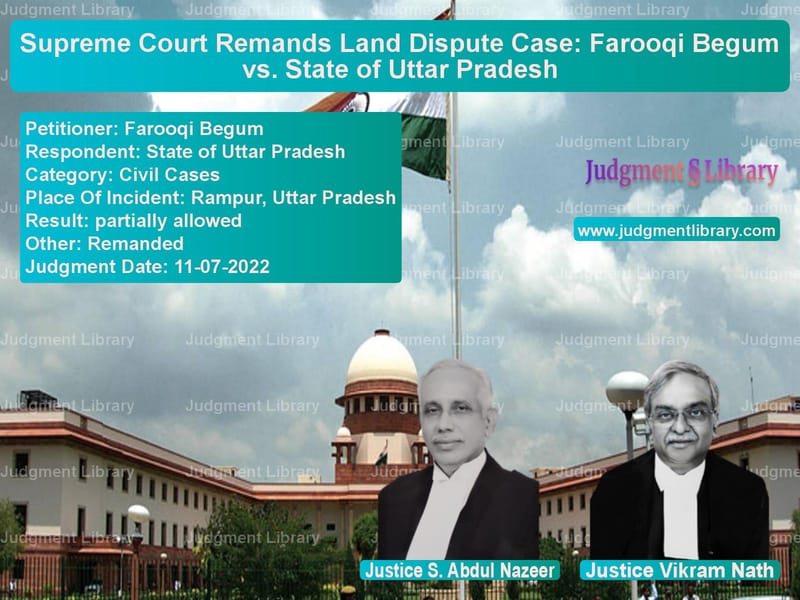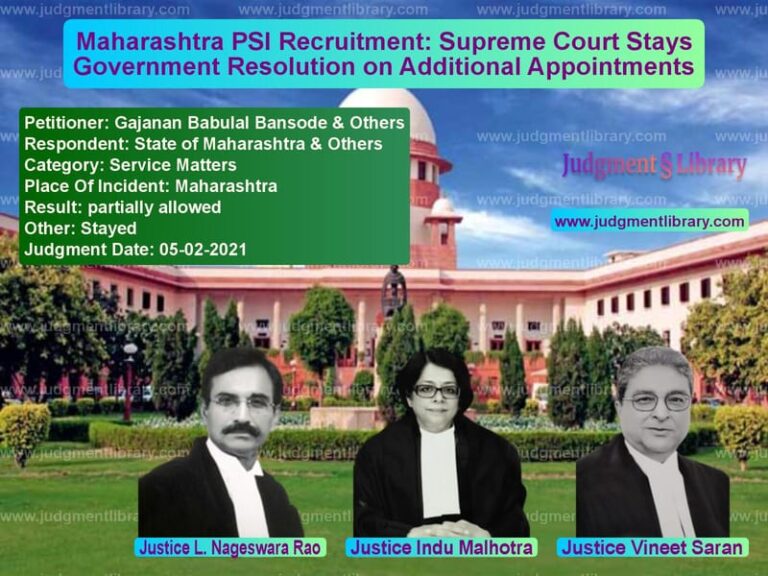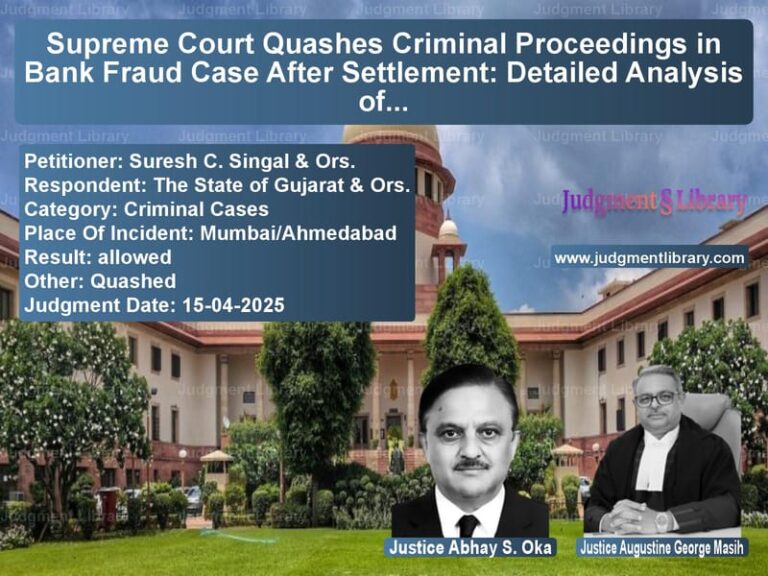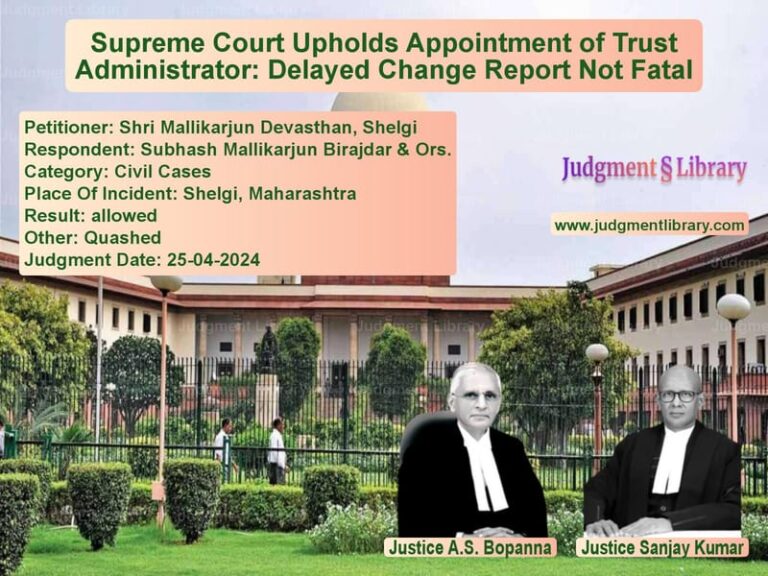Supreme Court Remands Land Dispute Case: Farooqi Begum vs. State of Uttar Pradesh
The case of Farooqi Begum vs. State of Uttar Pradesh is a significant legal battle concerning land ownership rights and the validity of resumption orders issued by the erstwhile princely state of Rampur. The Supreme Court’s ruling, delivered by a bench comprising S. Abdul Nazeer and Vikram Nath, remanded the matter back to the High Court for reconsideration after finding multiple errors in the previous judgments.
Background of the Case
The dispute revolves around a 20 bighas 10 biswa (pukhta) land in Village Thotar, Tehsil Sadar, District Rampur, known as Bagh Hazoor Pasand. The property was originally a rent-free grant from Nawab Hamid Ali Khan to his wife. After his death in 1930, his successor, Nawab Raza Ali Khan, allegedly resumed all such grants, including the land in question.
The State of Uttar Pradesh, claiming ownership over the land, filed Original Suit No. 1 of 1964 before the District Judge, Rampur, seeking a declaration, possession, and damages. The plaintiff contended that after the resumption, the land was integrated into the government’s estate and controlled by the U.P. State Garden Department.
On the other hand, Farooqi Begum, the widow of Nawab Hamid Ali Khan, contested the suit, asserting that:
- She had uninterrupted possession of the land since 1924.
- The resumption order was never properly documented.
- Her name continued in revenue records due to collusion with officials.
- The land, being part of her husband’s unconditional gift, could not be resumed.
- The State’s attempt to alter land records was blocked by the revenue courts.
Trial Court Proceedings
The Trial Court, after considering the evidence, decreed the suit in favor of the State on November 13, 1966. The ruling was based on the assumption that the grant had been resumed and that the State had lawful possession of the land.
Farooqi Begum appealed the decision before the Allahabad High Court, which remanded the case for a fresh trial after allowing an amendment in pleadings on September 8, 1971. The remand led to a second round of hearings, resulting in another decree in favor of the State on May 1, 1973.
The second appeal, Second Appeal No. 813 of 1975, was dismissed by a Single Judge of the Allahabad High Court on July 21, 2006, prompting the present Supreme Court challenge.
Arguments by the Appellant (Farooqi Begum)
- The burden of proof was wrongly placed on her instead of the State.
- The State relied on inadmissible evidence, such as secondary documents that were not properly authenticated.
- The Muafiat Register presented by the State contained irregularities, with key entries in different ink, suggesting possible tampering.
- The courts ignored material evidence supporting her continuous possession.
- Under Muslim personal law, an unconditional gift from a husband to his wife is irrevocable, making the State’s claim legally unsound.
Arguments by the Respondent (State of Uttar Pradesh)
- All lower courts had ruled in the State’s favor based on consistent findings.
- The revenue records demonstrated that the land had been resumed in 1930.
- The plaintiff had led credible evidence proving government possession and control over the land.
- The letter dated July 19, 1954, allegedly written by Farooqi Begum, indicated that she sought permission to regain possession, proving that she was not in possession at the time.
Supreme Court’s Observations
The Supreme Court scrutinized the evidence and identified key flaws in the High Court’s ruling:
- There was no conclusive proof that the resumption order had been executed.
- The revenue records relied upon by the State were inconsistent and failed to establish clear government possession.
- The lower courts erred in ignoring the principles of burden of proof.
- The Muafiat Register, which recorded the resumption, contained loose pages and different ink entries, raising doubts about its authenticity.
- The courts placed undue reliance on the 1954 letter, despite it not being properly verified by handwriting experts.
- The claim that the land was being utilized by the U.P. State Garden Department was not substantiated.
The Supreme Court ruled:
“The High Court fell in error in not taking into consideration the relevant material and instead relying upon inadmissible evidence or evidence which had no bearing to the findings.”
Final Judgment
Based on these findings, the Supreme Court set aside the High Court judgment and remanded the case for reconsideration. The Court directed:
- The High Court must conduct a fresh review of evidence, considering all material facts.
- All legal and factual issues raised by both parties must be re-examined.
- The appeal should be disposed of expeditiously.
The ruling underscores the importance of ensuring that land disputes, particularly those involving historical claims and government resumption, must be decided on the basis of clear and credible evidence rather than assumptions.
Petitioner Name: Farooqi Begum.Respondent Name: State of Uttar Pradesh.Judgment By: Justice S. Abdul Nazeer, Justice Vikram Nath.Place Of Incident: Rampur, Uttar Pradesh.Judgment Date: 11-07-2022.
Don’t miss out on the full details! Download the complete judgment in PDF format below and gain valuable insights instantly!
Download Judgment: farooqi-begum-vs-state-of-uttar-prade-supreme-court-of-india-judgment-dated-11-07-2022.pdf
Directly Download Judgment: Directly download this Judgment
See all petitions in Property Disputes
See all petitions in Judgment by S. Abdul Nazeer
See all petitions in Judgment by Vikram Nath
See all petitions in partially allowed
See all petitions in Remanded
See all petitions in supreme court of India judgments July 2022
See all petitions in 2022 judgments
See all posts in Civil Cases Category
See all allowed petitions in Civil Cases Category
See all Dismissed petitions in Civil Cases Category
See all partially allowed petitions in Civil Cases Category







